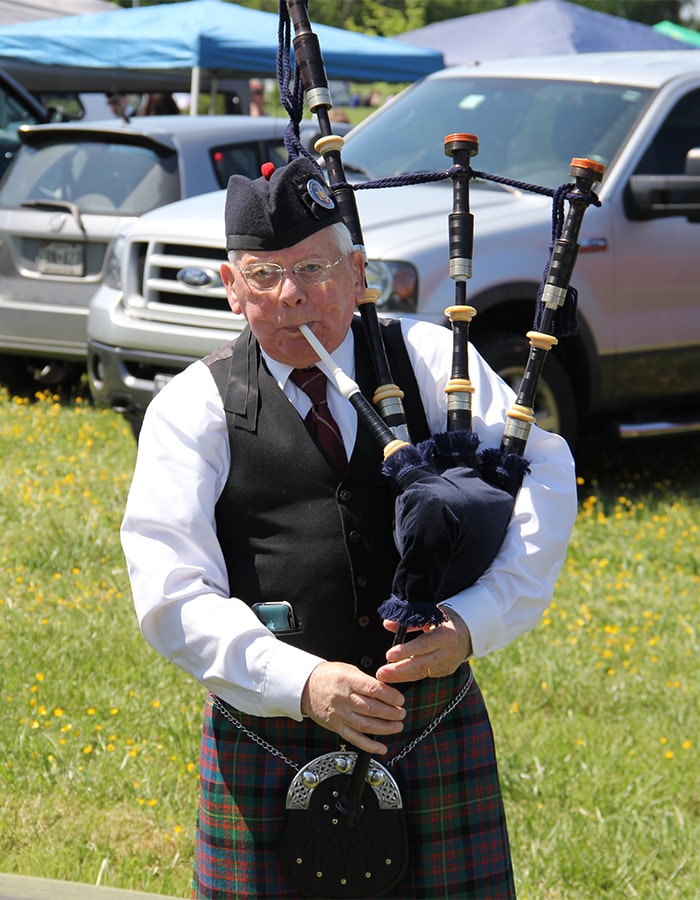Obituary: McIntosh Founded World's First Bagpiping Degree Program at CMU
By Kelly Saavedra and Andrew Carlisle
Jimmy McIntosh, a royal performer and composer who founded the world’s first bagpiping degree program at Carnegie Mellon University, died Feb. 8, at his home in Anderson, South Carolina. He was 95.
McIntosh was born in 1925 in Broughty Ferry, Scotland. He began learning the bagpipes during his youth and soon joined the local pipe band, playing with them as a boy at local parades and engagements.
At the age of 14, McIntosh enlisted in the Cameron Highlanders, a Scottish infantry regiment within the British Army, where he served for 10 years. During his military career, he was a frontline soldier first and a ceremonial piper second. Being an accomplished bagpiper by this time, he had the unique opportunity to study under some of the greatest pipers of the early 20th century. Following military service in WWII, McIntosh was promoted to the rank of Pipe Major and served as Pipe Major of the Cameron Highlanders in Malaya in 1947.
In the 1950s and 1960s, McIntosh taught piping in local schools in North East Scotland and secured grants from district councils for obtaining manuscripts for the public library, composed by Angus MacKay, the first sovereign’s piper for Queen Victoria. This scholarly work preserved some bagpipe compositions that otherwise would have been lost.
In 1965, McIntosh went on to study with Queen Elizabeth II’s personal Royal Pipers at her residence in Scotland, Balmoral Castle.
Throughout the 1960s and 1970s, McIntosh was one of the most prolific solo-piping prize winners in Scotland for both piobaireachd, the ancient music of the bagpipe, and light music. A world champion by the early 1970s, he began traveling to the United States and Canada to conduct bagpipe workshops and master classes. During these weeklong seminars, hundreds of pipers from across North America would flock to learn from the maestro.
In 1974, he founded the Competing Pipers Association, the world body for solo piping. He is directly responsible for encouraging many young pipers around the world to study piobaireachd, which is more popular today than at any time in history.
In 1982, McIntosh immigrated to the United States, first to Newark, Delaware, and then soon afterward to Pittsburgh, Pennsylvania, where in 1985 he was hired by Carnegie Mellon to instruct its pipe band program.
"They struck gold when they got Jimmy."
— Paul Gerlach
“They struck gold when they got Jimmy. He was the real deal,” said Paul Gerlach, CMU artist lecturer in music education and director of the Kiltie Band. “He was a lot of fun to work with, and in addition to being a world champion piper, he was also a reed maker. He was in high demand for his reed-making. People really respected his craftsmanship.”
In 1991, McIntosh founded the world's first degree program in bagpiping at Carnegie Mellon. This was the first time in history that a prestigious academic institution had recognized the Great Highland Bagpipe as a legitimate instrument worthy of academic study.
During his tenure at Carnegie Mellon, McIntosh taught dozens of pipers, some of whom are now teaching other piping programs throughout the United States, carrying on his legacy to the next generation.
Andrew Carlisle, who has been directing the piping program at CMU since 2010 and to whom McIntosh was a mentor and close friend, says he is single-handedly responsible for both the growing numbers and ever-increasing quality of bagpipers throughout North America.
“Knowing someone of Jimmy’s musical stature was just amazing. After Jimmy moved to South Carolina, I continued to visit him often, and I would always take my pipes and play tunes for him to get his expert feedback. In turn, he would always play for me also,” Carlisle said. “The last time I heard him play was in June 2020. Even at the age of 95, he was playing his bagpipes for over an hour each and every day, and he was playing tremendously well.”
Carlisle said he will miss McIntosh’s quick-witted humor as much as he will miss his playing and teaching.
“Jimmy was always the life of the party, always full of stories from his long life,” Carlisle said. “He was also a very down-to-earth person. He would talk about meeting and having conversations with Queen Elizabeth II as if she were somebody he met at a grocery store.”
In 1994, McIntosh was honored by Queen Elizabeth II for his services to piping at Buckingham Palace with the title Member of the Most Excellent Order of the British Empire (MBE).
“Jimmy’s groundbreaking work created a platform for CMU to recruit talented musicians who are serious about their craft to study in a rigorous academic setting that honors our Scottish heritage,” said Gina Casalegno, vice president for Student Affairs and dean of students.
“He always had a kind smile to share and was deeply committed to the program he founded,” she said. “He will be missed, but his legacy lives on in our cherished CMU Pipes and Drums Band.”

